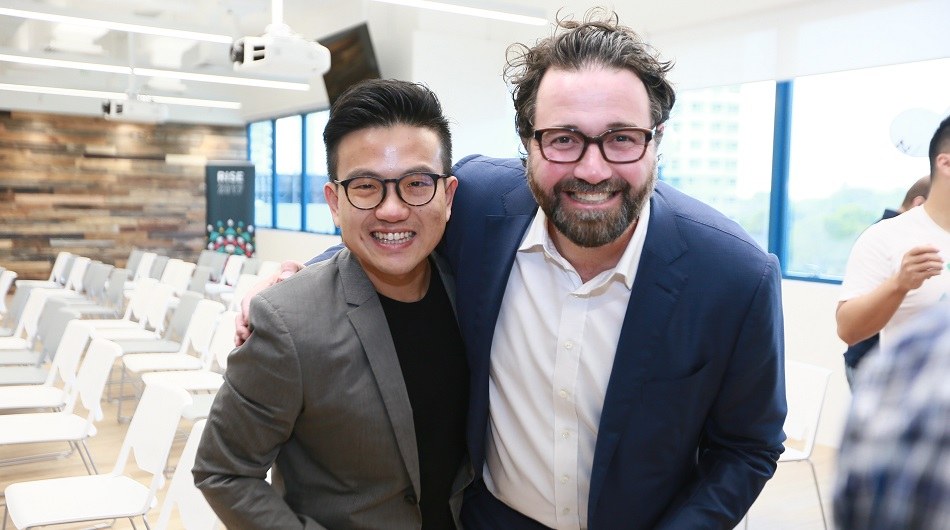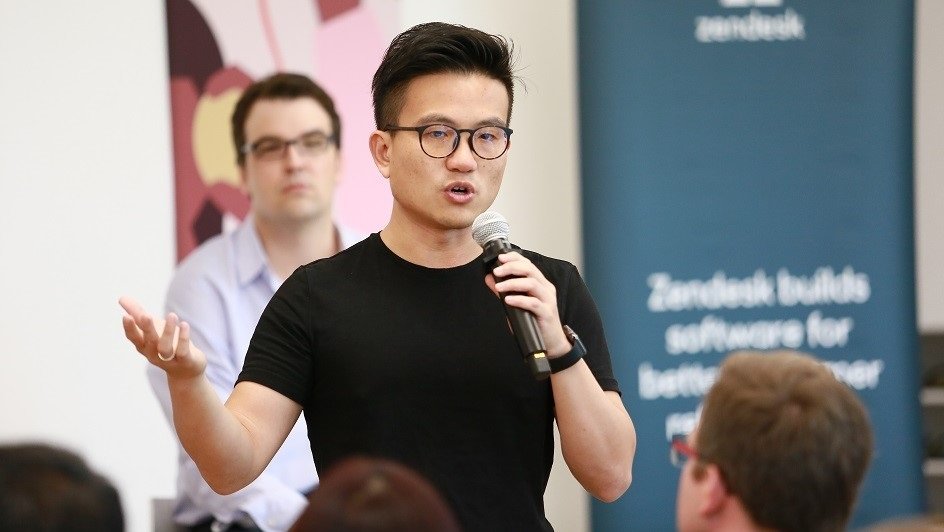
Zendesk GM of chat Royston Tay (L) and CEO Mikkel Svane at the company’s revamped Singapore office. Photo credit: Zendesk.
When Singaporean startup Zopim was bought by Silicon Valley customer engagement software company Zendesk, it became one of the country’s startup success stories.
It’s now almost three years after the acquisition, and while the Singapore office has grown to almost 100 people, the local managers have taken care to preserve the culture that got Zopim from a plucky startup to part of a cross-border organization. Not only that, they’ve been able to work through the tech talent shortage that plagues the local ecosystem and maintain a development team that serves clients all over the world.
“The culture evolves,” says Royston Tay, Zopim co-founder and Zendesk GM of chat. “When Zopim was founded, the culture was basically us, the founders. As we added new talent, the culture slowly evolved but its core was brought along as well.”
See: From beta to Facebook, strong bonds held Zopim together on its way to the top
New people, new products
Zendesk announced today it’s expanding its Singapore office, which pulls double duty as the company’s Asia-Pacific headquarters and a development center for Zendesk Chat. This is an evolution of the live chat product that drove Zopim’s success.
“When we started with the idea of building a real-time communication layer between customers and businesses in 2007, the best place to do it was on a website,” Royston tells Tech in Asia. Now the audience is spread out – on their phones, on a myriad of messaging apps.
Talent supply is not going to suddenly balloon overnight, but demand really has.
The goal for this product is to be a real-time conversation engine for businesses regardless of what customers use – chat, messaging, or social media apps. “So long as you’re having a live conversation with a business, you’ll be using our product,” Royston says.
On top of the expanded Singapore office, Zendesk recently unveiled another four offices in Asia-Pacific: a development center in Melbourne, a customer experience hub in Manila, and sales offices in Tokyo and Bangalore.
In Singapore, the company will hire more people for its chat research and development team, including product specialists and engineers. The plan, for now, is to have an overall headcount of around 120. Zendesk is working with Singapore’s Economic Development Board to support the hiring of more Singapore citizens and permanent residents through wage subsidies.
Hiring in Singapore
Like many startups and tech companies in Singapore, Zendesk has to find ways to address the scarcity of technical staff.
Royston is happy to report things have improved since the Zopim days. “Back then, there just wasn’t a very deep pool of talent that was sold on joining a startup,” he says. The company had to staff up with mostly fresh graduates. The Zendesk deal helped them add a little more maturity and experience by bringing in more “gray hairs.”
What’s changed now is that more international tech companies like Google and Facebook are staffing up in Singapore and startups are becoming more attractive places to work. That leads to a deeper pool to fish talent out of but also to more competition between employers.
“Talent supply is not going to suddenly balloon overnight, but demand really has,” Royston says. “It’s been steadily increasing as startup and tech becomes more heavily invested in and a more lucrative sector. When you get money, you want to spend it.”
Royston thinks that, despite the shortage, finding good people to hire is a matter of companies being more creative. Recruiters have to go beyond normal channels and sell both the job and Singapore as a place to work and live.

Royston speaks at Zendesk’s Singapore office. Photo credit: Zendesk.
Culture shock
Running a full-fledged development team from Singapore and keeping it in sync with Zendesk’s other offices around the world is no small feat. It’s one that has led to a lot of changes in the office day-to-day. “In the past, if we had a slight pivot or change in direction, it was just one town hall away from being communicated to the team,” Royston says.
You should never hire fast when you don’t have the core culture in place.
Today, these things are subject to processes and approvals – but Zendesk tries to keep them as transparent as possible. Town halls still take place, both regional and global ones. “We don’t want to be a corporate bureaucracy – if you have a town hall where [CEO Mikkel Svane] is just talking down to everyone, it’s not gonna work.”
So these meetings always have plenty of questions from the team that are uploaded online and addressed at the end of the sessions. “The most awkward questions pop up,” Royston laughs. “I think that’s a necessary way of keeping employees engaged.”
This concept of keeping the team engaged in the company’s day-to-day is not a far cry from how Royston and his co-founders ran Zopim. Royston recalls getting the Zendesk founders to come to Singapore and talk to Zopim’s employees to clinch the deal. Unorthodox as the request was, they did come and even interviewed a lot of the employees one-on-one.
“We’d never been acquired before, we didn’t know what the fuck we were doing,” Royston laughs. “We thought this was normal.”
Hire slow, fire fast
When it comes to building a team, Royston quotes the time-honored “hire slow, fire fast” mantra. “You should never hire fast when you don’t have the core culture in place,” he says. Each new hire changes the culture, so when you double or triple your team numbers in a matter of months, it’s harder to control what the company becomes.
“We have to be respectful of new people coming in and the culture they will bring along but we are also trying to preserve aspects we feel are important,” Royston points out.
These aspects range from encouraging a more family-like atmosphere, with people removing their shoes in the office (“It’s weird as hell for customers,” he laughs), to employees being evaluated by their actual contribution rather than how many hours they spend at their desks.
“These are the things we hold dear to our heart and I don’t think will change no matter how big we become,” Royston adds.
This approach has allowed the company to retain a large part of its team. “Since incorporating Zopim back in 2007, I can count on one hand – maybe on two hands – the number of employees who left us voluntarily. The culture is really what keeps the team very cohesive and united over here,” he says.
This post Here’s how Zendesk finds talent and maintains a startup culture in Singapore appeared first on Tech in Asia.
from Tech in Asia https://www.techinasia.com/zendesk-royston-tay-hiring-startup-singapore
via IFTTT
No comments:
Post a Comment